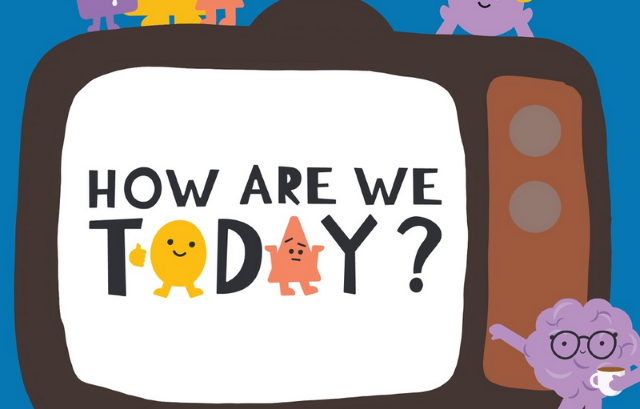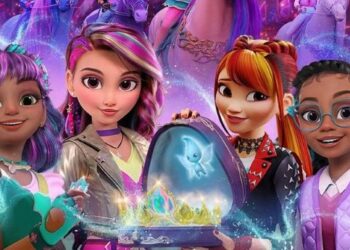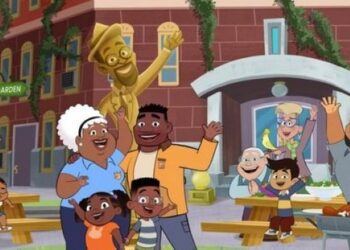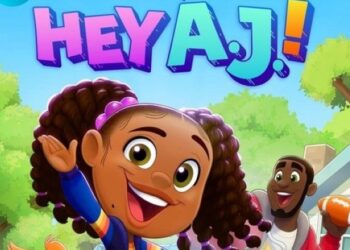Not too long ago, mental health wasn’t something families talked about at the dinner table. Feelings were brushed aside, and conversations about anxiety or depression were often met with silence. But today’s kids, and their parents, are learning that talking openly about emotions is just as important as learning to read or ride a bike with PBS’s How Are We Today?
The new PBS show, created by actor Tyler Coe, is aimed at viewers 11 and up, the show takes a sitcom-style approach to something rarely explored on children’s TV, emotional wellness. Tyler, who has lived with bipolar disorder and has survived substance abuse and a suicide attempt, says the project comes from a deeply personal place.
“That’s one of the reasons why I wanted to make this show, is that the stories we hear, the strife we have to go through, the amount of time it takes—we have to start shortening those years. We have to put a dent in that timeline,” Tyler tells Parents in a recent interview. He adds that How Are We Today? is designed to reach kids early, before they face crises alone.
“It is targeted at that danger zone, when almost 50% of all mental health conditions come online,” Tyler says. Still, he insists the series isn’t just for kids. Tyler wants to emphasize that How Are We Today? “is literally for everyone.”
How Are We Today? is set in an apartment building where Tyler and his friends live, the show follows a close-knit group of neighbors as they navigate real-life mental health issues together. Each of the seven episodes focuses on a different topic from managing panic attacks and ADHD to understanding the difference between sadness and depression.
“Kids nowadays can handle it,” Tyler says. “They can handle it better than we did. They’re not stupid.”
Inspired by television icons Fred Rogers and LeVar Burton, Tyler explains that the show’s foundation rests on four pillars: “kindness, education, science, and working together.”
To make sure those ideas translate responsibly, Tyler teamed up with Dr. Erin Newins, a licensed clinical psychologist known as “Dr. Erin” on the show. She ensures each storyline reflects both emotional truth and scientific accuracy.
“There are good people online that are influencers or content creators that are focused on mental health, but it’s splintered, which can lead to a lot of dangerous things,” explains Tyler. “It can lead to diagnosing you because of what your sign is.”
“I don’t think it’s enough to just talk about these things,” he continues. “The actionable items are completely missed. So Erin adds into that piece of like, we are giving you real-time things to do.”
Dr. Erin wanted the series to feel approachable for families, not clinical or intimidating. She says she hopes it feels like “… a fluid, very authentic, very friendly conversation.” When developing activities that viewers could try at home, she was careful to choose safe, universal tools that anyone could use.
“I’m very aware of people who present information publicly as if this is going to work for everybody,” says Dr. Erin. “I think the most important part is that we were very careful and intentional about what we chose.” She wanted the skills included in the show to be ones “that pretty much anybody could pick up at any given time [that] wouldn’t cause any harm.”
One example? The panic attack episode features awareness activities like breathing exercises, body scans, and journaling, small, practical steps that families can practice together.
Dr. Erin says parents can use the show as a gentle icebreaker to start difficult conversations about feelings. “The most important thing is opening the line of communication, and I think that’s the hardest, because we as parents are so task-focused,” she says. “We have things we have to do, we have lessons we have to teach.” Watching alongside kids can make a big difference.
“What this show offers is an opportunity to be in the same place while the conversation is happening,” explains Dr. Erin. “And sometimes it’s literally that simple. ‘Have you ever felt that way?’ is all you have to [say]. And then the door is open.”
Whether families are dealing with anxiety, stress, or just the ups and downs of everyday life, How Are We Today? reminds viewers that caring for our minds isn’t just for moments of crisis, it’s for everyone. As Dr. Erin puts it, the show is not “reserved for people who are broken, who have something wrong with them.”
“Everybody has mental health.” And as Tyler adds with a smile, “If you’re going through life, this is a good show for you.”
Photo Credit: Tyler Coe Instagram; How Are You Today? Instagram







